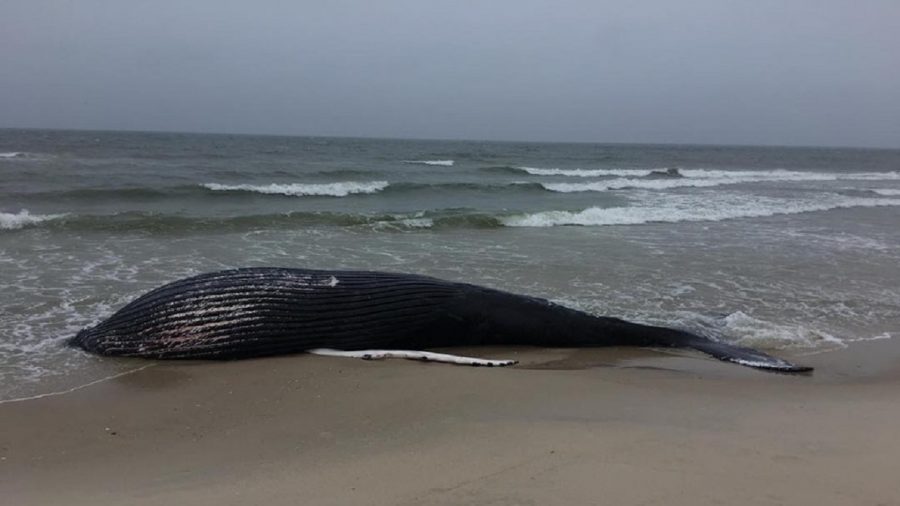A 37-foot long humpback whale washed up on shore in New York state, the first large whale to become stranded this year.
The female whale washed up dead on Westhampton Beach on Long Island on May 5.
“This is the first large whale to strand in New York this year,” according to the Atlantic Maine Conservation Society.
Marine biologists from the society examined the whale and said it is a female and shows no exterior signs of serious injury, the blog 27 East reported later Sunday. The society said it would conduct a necropsy on the dead whale on Monday and was arranging for heavy equipment to move the whale from the beach.

According to the National Oceanic and Atmospheric Administration, there has been an “unusual mortality event” involving humpback whales along the Atlantic Coast since January 2016 to the present.
Such an event is defined “as a stranding event that is unexpected, involves a significant die-off of any marine mammal population, and demands immediate response.”
The event is still under investigation.
“A portion of the whales have shown evidence of pre-mortem vessel strike; however, this finding is not consistent across all whales examined. More research is needed,” the administration stated. It has assembled an independent team of scientists to work with the agency to try to figure out what’s going on.

The number of strandings from Florida to Maine jumped from 2015 to 2016, with 26 total in 2016. Thirty-four more were recorded in 2017 and 25 were recorded in 2018.
New York saw the second-most strandings during the time period, with 17 recorded, just behind Virginia’s 19. Massachusetts and North Carolina each had 14 whales wash up dead.
Some 10,400 to 10,752 humpback whales are believed to reside in the North Atlantic Ocean.
North Atlantic right whales and minke whales are also dying off up and down the coast. Scientists estimate that there are only about 450 of the former, making it among the rarest of the marine mammals in the world.

Suzanne Thurman, executive director of the Marine Education, Research and Rehabilitation Institute in Lewes, Delaware, told The News Journal in April 2018 that right whale females typically give birth once every three years but lately that frequency has dropped dramatically to once every eight years.
“These days, right whale females, most are dead by the time they’re 50,” she said. “A lot of them are dying in their 30s. They’re living shorter lives and they’re having fewer calves.”
Barbara Zoodsma, a right whale biologist with the National Oceanic and Atmospheric Administration, said that increased interaction with humans and human activities is definitely part of the problem. Different temperatures and other weather issues have also shifted when and where whales can find food, she told the Journal.
“For us, we go to the grocery store and know where the pickles and loaves of bread are,” Zoodsma said. “Then the store moves things around and it takes longer to find them. Then throw in there that there’s a supply problem. So now the store we always go to is out of pickles and we have to go to a different store. That’s what right whales are being faced with right now.”
“I’m going to stay out of that [climate change] debate, but it’s undeniable that things are changing,” Zoodsma added. “It’s undeniable that copepods (a type of zooplankton) that used to aggregate in huge swarms in the Bay of Fundy for right whales to feed on are no longer there. And that’s having an incredible effect.”


